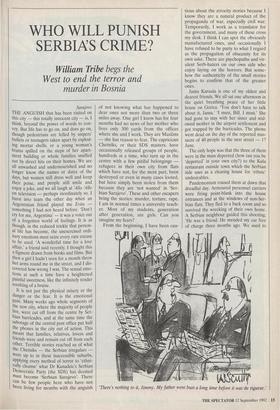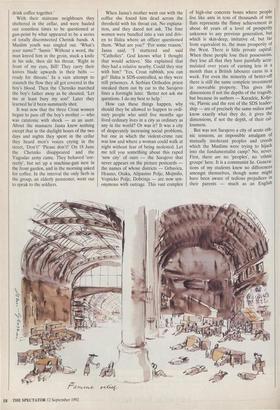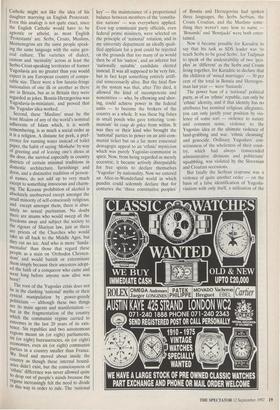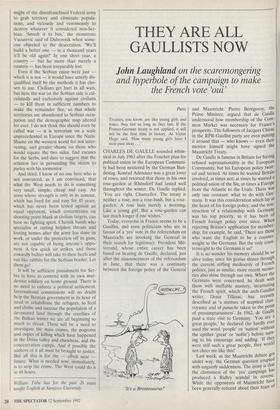WHO WILL PUNISH SERBIAS CRIME?
William Tribe begs the
West to end the terror and murder in Bosnia
Sarajevo THE ANGUISH that has been visited on this city — this totally innocent city — is, I think, beyond the power of words to con- vey. But life has to go on, and does go on, though pedestrians are felled by snipers' bullets or teenagers taken apart by explod- ing mortar shells, or a young woman's brains spilled on the steps of her apart- ment building or whole families snuffed out by direct hits on their homes. We are all unwashed and undernourished and no longer know the names or dates of the days, but women still dress well and keep their poise, and people still smile and enjoy a joke, and we all laugh at 'Allo 'Alio on television — perhaps inordinately so. I burst into tears the other day when an Argentinian friend played me Evita — something I had not heard before. 'Don't Cry for me, Argentina' — it was a voice out of a forgotten world of feelings. It is as though, in the reduced trickle that person- al life has become, the unexercised ordi- nary emotions must seize every rare excuse to be used. 'A wonderful time for a love affair,' a friend said recently. I thought this a figment drawn from books and films. But then a girl I hadn't seen for a month threw her arms round me in the street, and I dis- covered how wrong I was. The sexual emo- tions at such a time have a heightened Painful sweetness, like the infinitely tender soothing of a bruise. It is not just the physical misery or the danger or the fear. It is the emotional pain. Many weeks ago whole segments of the new city, where the majority of people live, were cut off from the centre by Ser- bian barricades, and at the same time the sabotage of the central post office put half the phones in the city out of action. This meant that families, relatives, lovers and friends were and remain cut off from each Other. Terrible stories reached us of what the Chetniks — the Serbian irregulars — were up to in these inaccessible suburbs, applying every method of terror to 'ethni- cally cleanse' what Dr Kanadzic's Serbian Democratic Party (the SDS) has deemed must become 'Serbian Sarajevo'. There can be few people here who have not been living for months with the anguish
of not knowing what has happened to dear ones not more than two or three miles away. One girl I know has for four months had no news of her mother who lives only 300 yards from the offices where she and I work. They are Muslims — she has reason to fear. The capricious Chetniks, or their SDS masters, have occasionally released groups of people, hundreds at a time, who turn up in the centre with a few pitiful belongings — refugees in their own city from flats which have not, for the most part, been destroyed or even in many cases looted, but have simply been stolen from them because they are 'not wanted' in 'Ser- bian Sarajevo'. These and other escapers bring the stories: murder, torture, rape. I am in normal times a university teach- er. Most of my students, generation after generation, are girls. Can you imagine my fears?
From the beginning, I have been cau- tious about the atrocity stories because I know they are a natural product of the propaganda of war, especially civil war. Temporarily, I work as a translator for the government, and many of these cross my desk. I think I can spot the obviously manufactured ones, and occasionally I have refused to be party to what I regard as the propagation of obscenity for its own sake. There are psychopaths and vir- ulent Serb-haters on our own side who enjoy laying on the horrors. But some- how the authenticity of the small stories begins to confirm that of the greater ones.
Jasna Karaula is one of my oldest and dearest friends. We all sat one afternoon in the quiet breathing peace of her little house on Gorica. 'You don't have to talk about it, Jasna."I must, Bill, I must.' She had gone to stay with her sister and wid- owed mother in the airport settlement and got trapped by the barricades. The phone went dead on the day of the reported mas- sacre of 40 people in the next street — 17 June.
The only hope was that the three of them were in the mass deported (how can you be 'deported' in your own city?) to the Kula restaurant outside town which the Serbian side uses as a clearing house for 'ethnic' undesirables.
Pandemonium roused them at dawn that dreadful day. Armoured personnel carriers were firing point-blank into the house entrances and at the windows of non-Ser- bian flats. They fled to a back room and so survived the wrecking of their own home. A Serbian neighbour guided this shooting. 'He was a friend. He mended my car free of charge three months ago. We used to
'There's nothing to it, Jimmy. My father went bust a long time before it was de rigueur.'
drink coffee together.'
With their staircase neighbours they sheltered in the cellar, and were hauled out countless times to be questioned at gun-point by what appeared to be a series of totally disconnected Chetnik bands. A Muslim youth was singled out. 'What's your name?' Samir.' Without a word, the man kneed him in the groin, stuck a knife in his side, then slit his throat. 'Right in front of my eyes, Bill! They carry their knives blade upwards in their belts — ready for throats.' In a vain attempt to staunch the flow they all got covered in the boy's blood. Then the Chetniks marched the boy's father away as he shouted, 'Let me at least bury my son!' Later they learned he'd been summarily shot.
It was now that the three Croat women began to pass off the boy's mother — who was catatonic with shock — as an aunt. About the massacre Jasna knew nothing except that in the daylight hours of the two days and nights they spent in the cellar they heard men's voices crying in the street, 'Don't!' Please don't!' On 18 June the Chetniks disappeared and the Yugoslav army came. They behaved 'cor- rectly', but set up a machine-gun nest in the front garden, and in the morning asked for coffee. In the interval the only Serb in the group, an elderly pensioner, went out to speak to the soldiers. When Jasna's mother went out with the coffee she found him dead across the threshold with his throat cut. No explana- tion, and they dared not ask. The four women were bundled into a van and driv- en to Ilidza where an officer questioned them. 'What are you?' For some reason,' Jasna said, 'I stuttered and said "Catholics". God knows what I thought that would achieve.' She explained that they had a relative nearby. Could they stay with him? 'Yes, Croat rubbish, you can go!' Ilidza is SDS-controlled, so they were still prisoners. A Serbian Orthodox priest sneaked them out by car to the Sarajevo lines a fortnight later. 'Better not ask me questions. I do my best to help.'
How can these things happen, why should they be allowed to happen to ordi- nary people who until five months ago lived ordinary lives in a city as ordinary as any in the world? Or was it? It was a city of desperately increasing social problems, but one in which the violent-crime rate was low and where a woman could walk at night without fear of being molested. Let me tell you something about this raped 'new city' of ours — the Sarajevo that never appears on the picture postcards — the names of whose districts — Grbavica, Hrasno, Otaka, Alipasino Polje, Mojmilo, Vojnicko Polje, Dobrinja — are now syn- onymous with outrage. This vast complex
of high-rise concrete boxes where people live like ants in tens of thousands of tiny flats represents the flimsy achievement in about 40 years of a level of prosperity unknown to any previous generation, but which is skin-deep, imitative of, but far from equivalent to, the mass prosperity of the West. There is little private capital. When these people lose their possessions, they lose all that they have painfully accu- mulated over years of earning less in a month than a British labourer earns in a week. For even the minority of better-off there is still the same complete investment in moveable property. This gives the dimensions if not the depths of the tragedy, but because its authors — Karadzic, Kolje- vic, Plavsic and the rest of the SDS leader- ship — are of precisely the same milieu and know exactly what they do, it gives the dimensions, if not the depth, of their cal- lousness.
But was not Sarajevo a city of acute eth- nic tensions, an impossible amalgam of mutually intolerant peoples and creeds which the Muslims were trying to hijack into the fundamentalist camp? No, never. First, there are no 'peoples', no 'ethnic groups' here. It is a communist lie. Genera- tions of my students knew no differences amongst themselves, though some might have been aware of tedious prejudices In their parents — much as an English
Catholic might not like the idea of his daughter marrying an English Protestant. Even this analogy is not quite exact, since the English Catholic would have to be agnostic or atheist, as most English 'Protestants' are. Serbs, Croats, Muslims, Montenegrins are the same people speak- ing the same language with the same gen- eral culture. The varieties of dialect, custom and 'mentality' across at least the Serbo-Croat-speaking territories of former Yugoslavia are no greater than you would expect in any European country of compa- rable size. There were a few lunatic-fringe nationalists of one ilk or another as there are in Britain, but as in Britain they were regarded as jokes. Bosnia-Herzegovina was Yugoslavia-in-miniature, and proved that the Yugoslav idea worked.
Second, these 'Muslims' must be the least Moslem of any of the world's nominal adherents of Islam which, it is worth remembering, is as much a social order as it is a religion. A distaste for pork, a pref- erence for running water instead of toilet Paper, the habit of saying `Merhaba' by way of greeting and of leaving one's shoes at the door, the survival especially in country districts of certain minimal traditions in domestic architecture, furnishings and dress, and a distinctive tradition of person- al names, do not add up to very much except to something innocuous and charm- ing. The Koranic prohibition of alcohol is absolutely unobserved except amongst the small minority of self-consciously religious; and except amongst them, there is abso- lutely no sexual puritanism. No doubt there are imams who would sweep all the freedoms away and subject the society to the rigours of Shariyat law, just as there are priests of the Churches who would take us all back to the Middle Ages, but they cut no ice. And who is more 'funda- mentalist' than those that regard these People as a stain on 'Orthodox Christen- dom and would banish or exterminate them simply because their ancestors adopt- ed the faith of a conqueror who came and Went long before anyone now alive was
born?
The root of the Yugoslav crisis does not lie in the clashing 'national' myths or their Cynical manipulation by power-greedy politicians — although these two things are its main agents and manifestation but in the fragmentation of the country which the communist regime carried to extremes in the last 20 years of its exis- tence. Six republics and two autonomous regions meant six (or eight) parliaments, six (or eight) bureaucracies, six (or eight) economies, even six (or eight) communist parties in a country smaller than France. We lived and moved about inside the Country as though these internal bound- aries didn't exist, but the consciousness of 'ethnic' difference was never allowed quite to drop out of people's minds because the r.egime increasingly felt the need to divide in this way in order to rule. The 'national key' — the maintenance of a proportional balance between members of the 'constitu- tive nations' — was everywhere applied. Even top communist party officials, even federal prime ministers, were selected on the principle of 'national' rotation, and in my university department an ideally quali- fied applicant for a post could be rejected on the grounds that too many of us would then be of his 'nation', and an inferior but 'nationally suitable' candidate elected instead. It was all supposed to be very fair, but in fact kept something entirely artifi- cial unnecessarily alive. But the fatal flaw in the system was that, after Tito died, it allowed the kind of incompetents •and nonentities — who, by elbowing and shov- ing, could achieve power in the federal units — to become the brokers of the country as a whole. It was these big fishes in small ponds who gave tottering 'com- munism' its coup de grace from within. It was they or their kind who brought the 'national' parties to power on an anti-com- munist ticket but on a far more esssential demagogic appeal to an 'ethnic' mysticism which was purely Yugoslav-communist in spirit. Now, from being regarded as merely eccentric, it became actively disreputable for free spirits to declare themselves 'Yugoslav' by nationality. Now we entered an Alice-in-Wonderland world in which pundits could solemnly declare that for centuries the 'three constitutive peoples'
of Bosnia and Herzegovina had spoken three languages, the Serbs Serbian, the Croats Croatian, and the Muslims some- thing they weren't sure how to name — 'Bosanski' and 'Bosnjackr were both enter- tained.
Now it became possible for Karadzic to say that his task as SDS leader was `to teach Serbs to be good Serbs', for Tudjman to speak of the undesirability of two 'peo- ples' as 'different' as the Serbs and Croats living together, for Karadzic to declare that the children of 'mixed marriages' — 30 per cent of the total in Bosnia and Herzogov- inan last year — were 'bastards'.
The power base of a 'national' political party, as of an 'ethnic' republic, can only be 'ethnic' identity, and if that identity has no attributes but nominal religious allegiance, you can only justify your position by vio- lence of some sort — violence to nature and common sense, violence to the Yugoslav idea or the ultimate violence of land-grabbing and war, 'ethnic cleansing' and genocide. Ordinary Yugoslays' con- sciousness of the wholeness of their coun- try, which had always transcended administrative divisions and politicians' squabbling, was violated by the Slovenian and Croatian secessions.
But fatally the Serbian response was a violence of quite another order — on the basis of a false identification of Yugosla- vianism with only itself, a utilisation of the might of the disenfranchised Federal army to grab territory and eliminate popula- tions, and viciously and venomously to destroy whatever it considered non-Ser- bian. 'Smash it to bits,' the monstrous Vucurevic said of Dubrovnik when some- one objected to the desecration. 'We'll build a better one — in a thousand years it'll be old again!' In one short year, a country — but far more than merely a country — has been irreparably lost.
Even if the Serbian cause were just — which it is not — it would have utterly dis- qualified itself by the methods it has cho- sen to use. Civilians get hurt in all wars, but here the war on the Serbian side is cal- culatedly and exclusively against civilians — to kill them in sufficient numbers to make the remainder flee, so that whole territories are abandoned to Serbian occu- pation and the demographic map altered for ever. I do not think this should even be called war — it is terrorism on a scale unprecedented in Europe since the Nazis. Shame on the western world for not inter- vening, and greater shame on those who would equate the two sides, find excuses for the Serbs, and dare to suggest that the solution lies in persuading the victim to parley with his tormentor.
And third, I know of no one here who is not convinced, as I am convinced, that what the West needs to do is something very small, simple, cheap and easy. An army whose strength is only in its armour, which has lived fat and easy for 45 years, which has never been tested against an equal opponent, which concentrates on shooting point-blank at civilian targets, can have no fighting spirit. Chetnik bands who specialise in cutting helpless throats and looting homes after the army has done its work, or under the protection off its guns, are not capable of being anyone's oppo- nent. A few quick air strikes, and those cowardly bullies will take to their heels and run like rabbits for the Serbian border. Let them go!
It will be sufficient punishment for Ser- bia to have to contend with its own mur- derous soldiery on home ground. There is no need to enforce a political settlement. International commissions will no doubt help the Bosnian government in its hour of need to rehabilitate the refugees, to feed and clothe and succour the population of a devastated land through the cruelties of the Balkan winter we are all beginning so much to dread. There will be a need to investigate the mass crimes, the pogroms and orgies of killing which have happened in the Drina valley and elsewhere, and the concentration camps. And if possible the authors of it all must be brought to justice. But all this is for the — albeit near — future. What is needed now, immediately, is to stop the crime. The West could do it in 48 hours.
William Tribe has for the past 26 years taught English at Sarajevo University.





































































 Previous page
Previous page